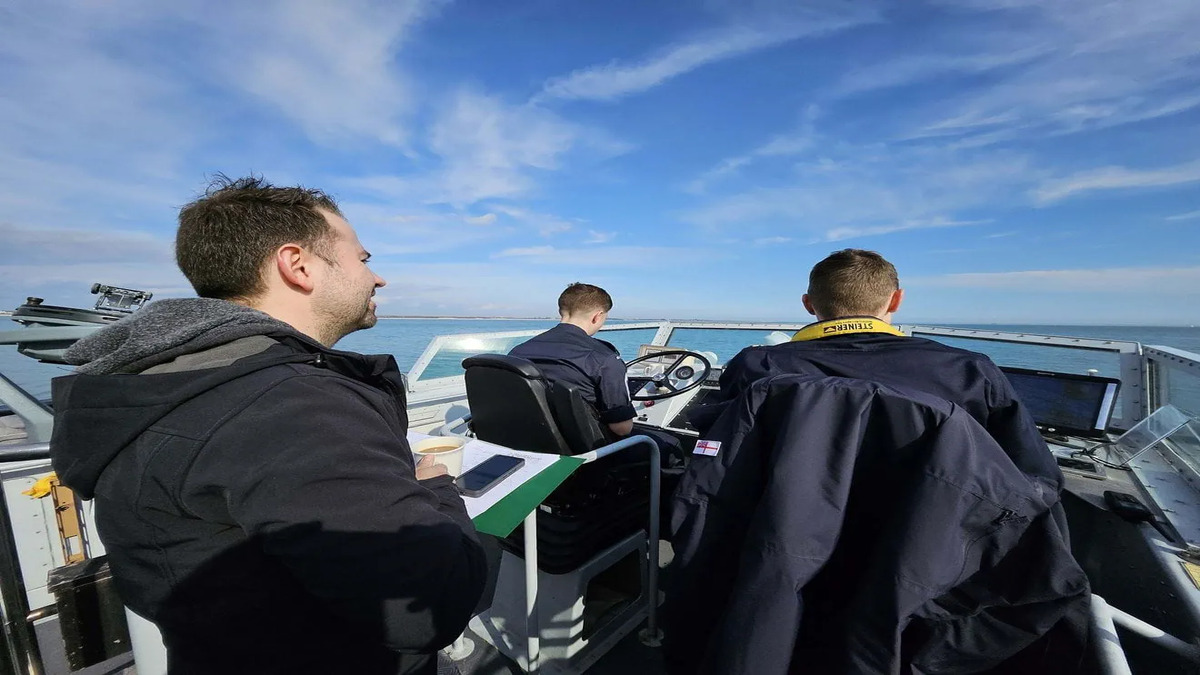The Royal Navy has completed trials of an ‘un-jammable’ quantum-powered navigation technology that could enable vessels to operate seamlessly in GPS-denied or degraded environments.
The trials aboard HMS Pursuer showcased “ground-breaking” cold atom technology that could transform navigation and covert monitoring capabilities independent of GPS.
On October 31, the Royal Navy highlighted the collaborative efforts between its Office of the Chief Technology Officer (OCTO) and UK-based quantum technology firm Aquark Technologies.
This partnership explored the potential of miniature cold atom systems for highly accurate positioning, navigation, and timing (PNT) capabilities, even when GPS signals may be compromised.
Central to this technological leap is Aquark Technologies’ innovative “supemolasses” laser cooling method. Unlike traditional cooling techniques, which rely on magnetic fields, this approach operates without one, reducing the equipment’s size, weight, and power requirements—an ideal adaptation for naval operations.

Cold atoms, cooled to near absolute zero, exhibit controlled quantum properties that allow them to detect even the smallest changes in motion and magnetic or electric fields, making them exceptionally valuable for precision sensing.
Commander Matthew Steele, heading future technology development at OCTO, said, “Quantum technologies being developed in the UK will offer an alternative Position, Navigation, and Timing (PNT) capability necessary to operate effectively in GPS-denied or degraded environments.”
“Over the next three years, the Navy seeks to accelerate the development of quantum technologies – such as Aquarks – through funding and sea trials to secure the Royal Navy an opportunity to invest in a non-GPS-based PNT capability and to maintain its global operating advantage,” Steele added.
During the trials, cold atoms were continuously generated in various locations aboard HMS Pursuer, although the Royal Navy noted that magnetic shielding remains a technical challenge requiring further refinement.
These trial findings will guide the development of Aquark’s AQlock, a prototype cold atom clock system positioned to become the UK’s first commercial cold atom clock.
Lieutenant John Hawke, Commanding Officer of HMS Pursuer, expressed pride in conducting these trials with Aquark Technologies. He remarked that the Royal Navy remains at the forefront of cutting-edge technology, supporting both operational advantage and UK industry growth.
UK Advances Quantum Navigation To Counter GPS Vulnerabilities
Following Russia’s 2022 invasion of Ukraine, the UK has significantly ramped up efforts to develop GPS-independent navigation solutions, driven by the prospect that future conflicts could be dominated by electronic warfare tactics like signal jamming, with little direct combat.
Earlier this year, reports surfaced indicating that Russian forces are actively jamming GPS and other satellite-reliant navigation systems in the Baltic Sea region.
The jamming approach involves overpowering the GPS frequency by broadcasting stronger signals from ground-based sources. Given that genuine GPS signals are transmitted from satellites 12,500 miles above the Earth, these satellite signals are relatively easy to overwhelm from nearby sources.
To counter this, the UK is investing in cold atom technology, a potential solution for maintaining navigational accuracy in GPS-denied environments.
Aquark Technologies recently secured €5 million in seed funding led by the NATO Innovation Fund and MBDA—a defense consortium including Airbus, BAE Systems, and Leonardo—to advance quantum technologies for defense applications.
Andrei Dragomir, Co-Founder and CEO of Aquark Technologies, highlighted the significance of recent trials, noting that they demonstrated real-world applications of cold atom technology.
He added that these successful trials bring the company closer to deployable quantum systems, which will be refined further with the support of recent investments.
Earlier this year, UK achieved a breakthrough by successfully completing the first flight trial of a quantum-powered navigation system.
The flight, organized by a group of quantum technology and aerospace companies, involved an aircraft equipped with a quantum inertial navigation system (Q-INS) that utilizes an atomic clock and an ultra-cold atom-based quantum system to detect motion changes. Unlike traditional GPS, this system operates independently of continuous satellite signals.
Beyond aviation, the technology has potential applications for submarines, space navigation, and self-driving vehicles, especially in regions where GPS is unreliable.
The project forms a part of Mission 4 of the UK’s National Quantum Strategy, which aims to deploy quantum navigation systems on aircraft by 2030 to enhance strategic resilience.
The implications of quantum technology extend beyond mitigating GPS vulnerabilities. Henry White, Sensing Technology Lead at BAE Systems, earlier said that this technology could deliver a substantial military advantage, ensuring precise, reliable knowledge of the location of any asset or sensor system, thus opening new possibilities for platform design and capability. White noted that such advancements are expected to play a critical role in next-generation combat air systems.
- Contact the author at ashishmichel(at)gmail.com
- Follow EurAsian Times on Google News